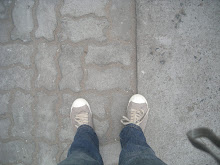Nothing is more fun than learning a new language, especially when one is old enough to be fluent in several others and is subconsciously averse to the idea of learning something new. And this especially applies to a language like French. So when a bunch of adults (and some young ones like me) come together, every morning, and attempt to speak this alien language, it is as good as joining a laughter club.
This language is easily the biggest waste of paper and ink. Its random usage of alphabets to fill in even the simplest of words has puzzled me. Why? Why would one put in so many alphabets, if one has no intention of pronouncing them whatsoever! For example, “many” translates to
beaucoup, which is pronounced as ‘
bow-cu’. As an unwritten rule 40% of the alphabets in any given word are silent. Learning to speak French is more like, learning what not to speak in French. Hence, ‘
Au revoir, tout le monde!’ (goodbye, everyone) is pronounced as
“Aaar-wha! Thool-mo.” No wonder, half the Indians think Aishwarya Rai is attending the “Khan” film festival.
One little thing, that could have made this language much simpler for
thool-mo, is the inclusion of a neutral gender. But no, every item in the universe is segregated as male and female… including articles, prepositions, adjectives and adverbs. Hence cars, bikes, houses and windows are all feminine. And Monsieur (miss-yore) Leo Tolstoy has apparently written ‘
Guerre et Paix’, yes, both are feminine. What the rules for such segregation are, no one knows! The problem with this approach is the multiplicity of words in the dictionary. Hence,
‘big’ can be grand (grao), grande (grao), grands (grao) and grandes (grao).
Another area that absolutely stumped me was the numbers. The guy making up this language was so obviously lazy, he could only think of words up till 69. After which he decided to use multiplication and addition, instead. So ‘
75’ in French is literally, ‘60 +15’ and
'98' is… ‘
4*20 + 10 + 8’. Yes,
quatre-vingt dix huit. I’m not even going to tell you how to pronounce it.
And even with such a huge vocabulary, the French have decided that they have to pronounce every word like it has an invisible sex appeal. So a set of 5 words, all meaning radically different things can be pronounced the same way –
dous, deux, de, des, du – all these spoken rapidly, sound identical! In the past, when I went to a
café, with the
crème de la crème and ordered
a la carte I thought I was superior. But these are after all words we learnt within a week in class.
This morning, in a reading exercise, when I crossed my eyebrows in concentration, pursed my lips and confidently read out “
foh yoh an-foh-may-cee-ohn” and looked up apprehensively at my instructor, she said, “Oh! Dear! That is English. It is pronounced,
for your information”.
Clearly, French is not for everyone.

